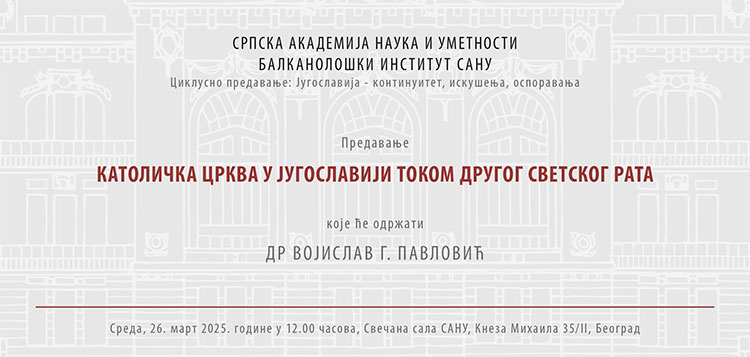Lecture ’Catholic Church in Yugoslavia during the Second World War’
The fifth volume titled ’Catholic Church in Yugoslavia during the Second World War’within the lecture series’Yugoslavia – Continuity, Trials, and Challenges,’ will be given by Vojislav Pavlović, PhD, director of the Institute of Balkan Studies of the Serbian Academy of Sciences and Arts on Wednesday, 26 March, at noon, at the SASA Grand Hall.
The Catholic Church perceived the Kingdom of Yugoslavia’s collapse and the establishment of the Independent State of Croatia (NDH) as the realization of long-held objectives. The Catholic Clergy played an integral role in the Croatian national movement. Drawing on an unfounded analysis of the alleged suffering of Croats in Yugoslavia created in nationalistic fervour, the clergy and Croatian political elite justified the establishment of an independent state. Therefore, this perspective reinforced the idea that coexistence with Serbs was unsustainable, raising the issue of their position within the NDH both for the clergy and Croatian political figures. The Ustaše regime pushed the views of the Croatian right to the ultimate extreme by committing genocide against Serbs, Jews and Roma. Within the Catholic clergy, reactions varied. Franciscans and some parish priests enthusiastically supported the Ustaše. Bishops endorsed the idea of an independent Croatian state, even under Ustaše rule
Both the Ustaše and bishops held a deep conviction that the Catholic faith was the cornerstone of the national identity of the Croats, which could only be preserved by a national state. However, differences existed. The Ustashe did everything in their power to physically eliminate the Serbs from the NDH. In a letter to Pius XII in June 1941, Alojzije Stepinac, the Archbishop of Zagreb, expressed his belief that if Ante Pavelić remained in power for the following 20 years, Orthodox Christianity would cease to exist in Croatia. A homogeneous Catholic Croatia was the ideal for both, but the paths to achieve it diverged. The Ustaše crimes provoked individual protests by bishops, but these never escalated into an outright condemnation of genocide. Until the final days of the NDH, the bishops remained committed to preserving the Croatian national state, which was an absolute imperative for them even at the expense of fundamental Christian principles.
Vojislav Pavlović is a principal research professor at the Institute for Balkan Studies of SASA. He earned his doctorate from the Faculty of Philosophy in Belgrade and the University of Paris–Sorbonne. He has taught history at several universities, including the University of Belgrade, the University of Limoges in France, and the American University in Paris. Since 2018, he has served as the director of the Institute for Balkan Studies of SASA.
His research focuses on the history of Yugoslavia’s international relations in the 20th century. He has authored two monographs: Tito. L’artefice della Jugoslavia comunista (Soveria Mannelli, Rubbettino, 2023) and From Serbia to Yugoslavia: France, Serbia, Yugoslavia from 1878 to 1918 (Novi Sad, Prometej; Belgrade, Radio-Television of Serbia, 2024). He currently leads the research project Pope Pius XII and the Challenge of Totalitarianism in Yugoslavia, 1941–1958.

